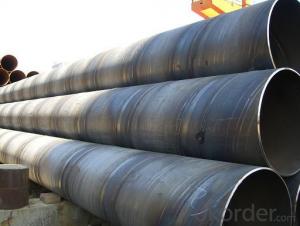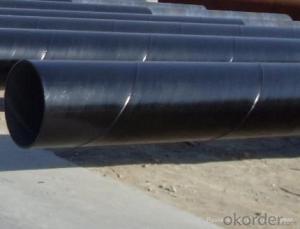SPIRAL STEEL PIPE48‘‘50’‘ LARGE DIAMETER PIPE
- Loading Port:
- Tianjin
- Payment Terms:
- TT OR LC
- Min Order Qty:
- 5 m.t.
- Supply Capability:
- 3000 m.t./month
OKorder Service Pledge
OKorder Financial Service
You Might Also Like
Packaging & Delivery
Packaging Detail: | standard export packing or as customer's requirement |
Delivery Detail: | within 10 - 30 days |
Specifications
Spiral Welded Steel Pipes and Tubes
1.Material:Q195-Q235
2.Length:1-12m
3.WT:1.0-14mm
4.O.D.:20-273mm
Spiral Welded Steel Pipes and Tubes
Product Description:
1.Material : Q235,Q345,L245,L290,L360,L415,L450,L485,GrB,X42,46,X52,X56,X60,X65,X70,X80,X100
2,Standard: SY/T5037-2000,GB/T9711-2011,API Spec 5L PSL1/PSL2,ASTM A252\A53,ISO3183,DIN17172,EN10217,JIS G3457,AWWA C200,ASTM A139,ASTM A671,ASTM A672
3.Wall thickness: 3.0mm-30mm
4.Outer diameter: φ168mm-3020mm
5,Length: 5m-12m or as your requirement
6,Corrosion protection standard: DIN30670,DIN30671, AWWAC210, AWWA C203, SY/T0413-2002,SY/T0414-2002
7,Application: Oil, gas, natural gas, water pipe, thermal electricity pipe, steel structure engineering, etc
Q195-q345 Material Steel Pipe's Materials
Elements | Chemical Compsition% | Mechanical Property | ||||||
C% | Mn% | S% | P% | Si% | Yield Point (Mpa) | Tensile Strength(Mpa) | Elongation | |
Q195 | 0.06-0.12 | 0.25-0.50 | <0.050< span=""> | <0.045< span=""> | <0.030< span=""> | >195 | 315-430 | 32-33 |
Q215 | 0.09-0.15 | 0.25-0.55 | <0.05< span=""> | <0.045< span=""> | <0.030< span=""> | >215 | 335-450 | 26-31 |
Q235 | 0.12-0.20 | 0.30-0.70 | <0.045< span=""> | <0.045< span=""> | <0.030< span=""> | >235 | 375-500 | 24-26 |
Q345 | <0.20< span=""> | 1.0-1.6 | <0.040< span=""> | <0.040< span=""> | <0.55< span=""> | >345 | 470-630 | 21-22 |
- Q:Can steel pipes be used for conveying hazardous chemicals?
- Steel pipes can be used for conveying hazardous chemicals, as they are highly resistant to corrosion and can withstand high pressures. However, it is crucial to consider the compatibility of the chemicals with steel and ensure that appropriate safety measures and protective coatings are in place to prevent any potential leaks or reactions.
- Q:How are steel pipes used in the construction of natural gas power plants?
- Steel pipes are used in the construction of natural gas power plants for various purposes, including transporting and distributing the natural gas. These pipes are used to connect the gas supply to different components of the power plant, such as turbines, boilers, and generators, ensuring a reliable and efficient flow of gas throughout the facility. Additionally, steel pipes are also used in the construction of the power plant's infrastructure, such as the cooling systems, exhaust systems, and other equipment that require durable and corrosion-resistant materials.
- Q:How can steel pipes be protected from corrosion?
- Steel pipes can be protected from corrosion through various methods. One common method is the application of protective coatings. These coatings act as a barrier between the steel and corrosive elements in the environment. The most widely used protective coating for steel pipes is epoxy, which provides excellent resistance to corrosion. Other coatings such as polyethylene and polyurethane can also be used depending on the specific application and requirements. Another effective way to protect steel pipes from corrosion is by cathodic protection. This technique involves the use of sacrificial anodes or impressed current systems to prevent corrosion. Sacrificial anodes, typically made of zinc or aluminum, are attached to the steel pipes. These anodes corrode instead of the steel, sacrificing themselves to protect the pipes. Impressed current systems, on the other hand, use a direct electrical current to counteract the corrosion process. Regular maintenance and inspection are crucial in the protection of steel pipes from corrosion. Monitoring the condition of the coatings, checking for any signs of damage or deterioration, and promptly addressing any issues can help prevent corrosion from occurring or spreading. Additionally, implementing proper drainage systems to avoid the accumulation of moisture around the pipes can further protect them from corrosion. Lastly, environmental factors should be taken into consideration when protecting steel pipes from corrosion. This includes mitigating exposure to corrosive substances, such as acids or chemicals, and ensuring proper ventilation and airflow to prevent the buildup of moisture and humidity. By implementing a combination of these protective measures, steel pipes can have an extended lifespan and maintain their structural integrity.
- Q:How are steel pipes stored and transported?
- Steel pipes are typically stored and transported in a systematic and efficient manner to ensure their safety and prevent damage. When it comes to storage, steel pipes are usually stacked horizontally or vertically in designated areas. If stacked vertically, they are often placed on custom-made racks or stands that provide support and prevent them from rolling or collapsing. This vertical stacking method saves space and allows for easy accessibility when needed. To protect steel pipes from corrosion and environmental elements, they are often coated with a layer of paint or other protective materials. Additionally, pipes are sometimes stored indoors in warehouses or storage facilities to shield them from adverse weather conditions. When it comes to transportation, steel pipes are typically loaded onto trucks, railcars, or ships depending on the distance and destination. Specialized equipment such as cranes or forklifts is used to handle and load the pipes onto the transportation vehicles. Pipes are secured tightly to prevent movement during transit using straps, chains, or braces. This ensures that the pipes remain stable and do not cause any damage to themselves or other cargo. For long-distance transportation, steel pipes are often transported in bundles or stacks, secured with additional reinforcements. Pipes may also be packed in protective coverings or containers to shield them from external factors such as moisture, dust, or impacts. Overall, the storage and transportation of steel pipes involve careful planning, proper handling, and appropriate protective measures to ensure their integrity and quality are maintained throughout the process.
- Q:How are steel pipes joined together?
- Steel pipes are commonly joined together using various welding techniques, such as arc welding, butt welding, or socket welding. Additionally, other methods like threaded connections, flanges, or mechanical couplings can be used for joining steel pipes.
- Q:How are steel pipes used in the construction of oil storage tanks?
- Steel pipes are used in the construction of oil storage tanks as they provide strength and durability to withstand the weight and pressure of the stored oil. These pipes are utilized for the tank's structural framework, ensuring stability and preventing leakage. Additionally, steel pipes are commonly used for the tank's piping system, allowing for the transportation of oil in and out of the storage facility.
- Q:What is the diameter of the steel tube DN20?
- Stress: the nominal diameter is not the outer diameter of the pipe, nor the inner diameter of the tube. It is not the average value of the inside and outside diameter (the nominal diameter of the equipment refers to the outer diameter).
- Q:Can steel pipes be coated for additional protection?
- Yes, steel pipes can be coated with various materials to provide additional protection against corrosion, abrasion, and other environmental factors. Coatings such as epoxy, polyethylene, and zinc can be applied to enhance the durability and lifespan of steel pipes, making them suitable for diverse applications in different industries.
- Q:Can steel pipes be used for swimming pool installations?
- Yes, steel pipes can be used for swimming pool installations. Steel pipes are known for their durability and strength, making them a suitable choice for underground or aboveground swimming pool plumbing systems. They are capable of handling high water pressure and can withstand the corrosive effects of pool chemicals. Additionally, steel pipes are resistant to extreme weather conditions and can be easily installed and maintained. However, it is important to ensure that the steel pipes are properly treated and coated to prevent rust and corrosion.
- Q:How are steel pipes used in the manufacturing of agricultural machinery and equipment?
- Due to their various advantageous properties, steel pipes have become widely utilized in the production of agricultural machinery and equipment. These pipes are employed in multiple ways to improve the efficiency and durability of such machinery. A primary application of steel pipes in agricultural machinery is their use in constructing frames and chassis. The exceptional strength and structural integrity of steel pipes make them an ideal choice for supporting heavy loads and enduring the demanding conditions often encountered in agricultural operations. Whether it is a tractor, combine harvester, or tillage equipment, steel pipe frames provide the necessary stability and sturdiness required for these machines to function efficiently in the field. Another common use of steel pipes in agricultural machinery is within hydraulic systems. These pipes function as conduits for hydraulic fluids, ensuring the smooth and reliable operation of various components, such as hydraulic cylinders, pumps, and motors. Thanks to their corrosion resistance and ability to withstand high pressure, steel pipes contribute to the longevity of hydraulic systems, reducing maintenance and repair costs for agricultural machinery. Moreover, steel pipes find application in the exhaust systems of agricultural equipment. To minimize environmental impact and maintain engine performance, it is essential to safely and efficiently expel the exhaust gases produced by engines. Steel pipes with suitable thickness and thermal resistance are employed in constructing exhaust systems, enabling the effective removal of exhaust gases while reducing noise pollution. Additionally, steel pipes are utilized in the manufacturing of irrigation systems and equipment used in agriculture. Whether it involves transporting water from a source to the fields or distributing water to crops through sprinklers or drip irrigation, steel pipes provide the necessary durability and pressure resistance for efficient water delivery while minimizing leaks. In conclusion, the incorporation of steel pipes in the manufacturing of agricultural machinery and equipment plays a vital role in enhancing their performance, durability, and efficiency. The exceptional strength, structural integrity, corrosion resistance, and high pressure capabilities of steel pipes make them indispensable components in various applications within the agricultural sector.
1. Manufacturer Overview |
|
|---|---|
| Location | |
| Year Established | |
| Annual Output Value | |
| Main Markets | |
| Company Certifications | |
2. Manufacturer Certificates |
|
|---|---|
| a) Certification Name | |
| Range | |
| Reference | |
| Validity Period | |
3. Manufacturer Capability |
|
|---|---|
| a)Trade Capacity | |
| Nearest Port | |
| Export Percentage | |
| No.of Employees in Trade Department | |
| Language Spoken: | |
| b)Factory Information | |
| Factory Size: | |
| No. of Production Lines | |
| Contract Manufacturing | |
| Product Price Range | |
Send your message to us
SPIRAL STEEL PIPE48‘‘50’‘ LARGE DIAMETER PIPE
- Loading Port:
- Tianjin
- Payment Terms:
- TT OR LC
- Min Order Qty:
- 5 m.t.
- Supply Capability:
- 3000 m.t./month
OKorder Service Pledge
OKorder Financial Service
Similar products
New products
Hot products
Related keywords






























